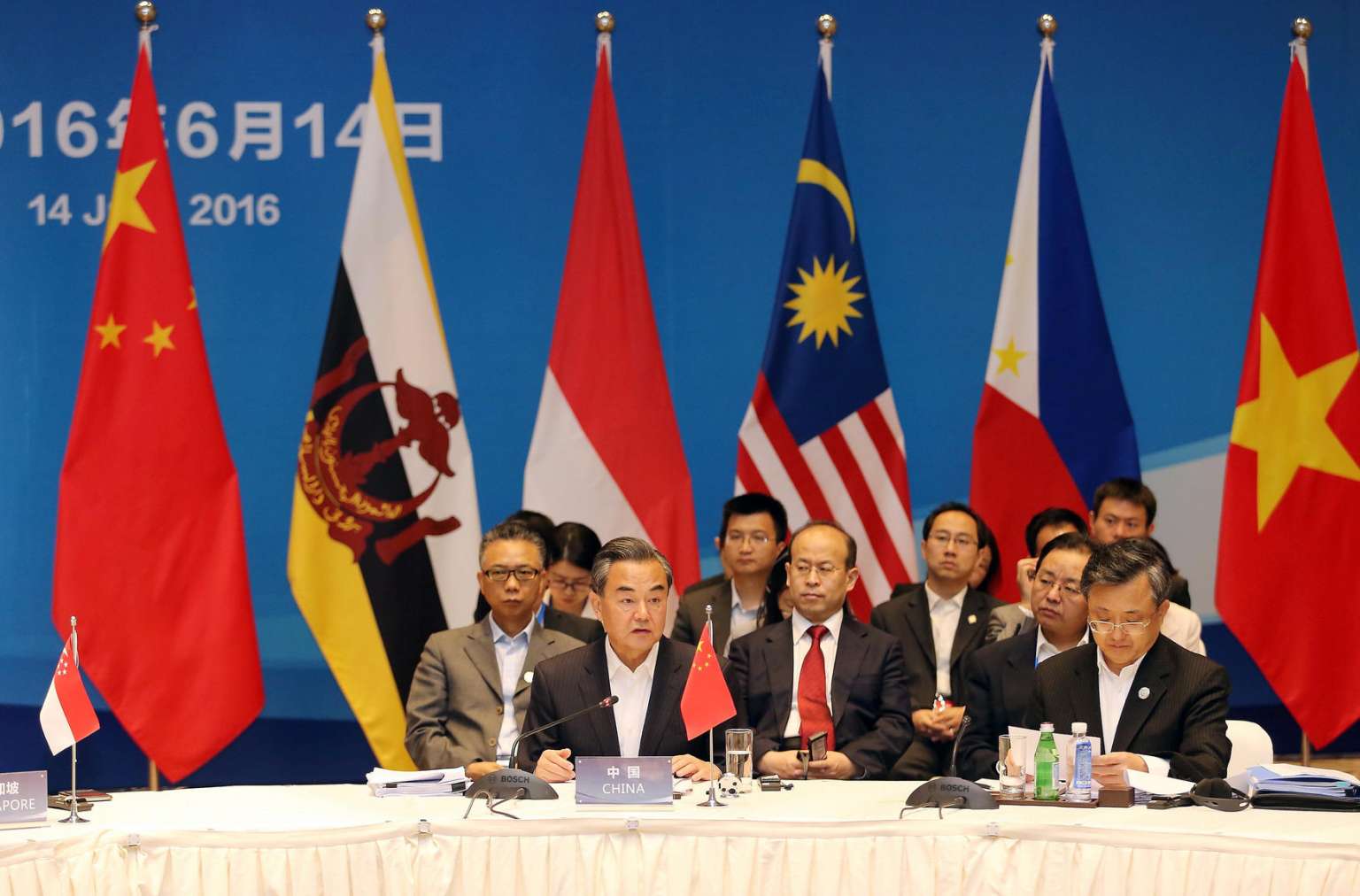China sought to divide Asean with its own 10-point consensus at Foreign Minister meet: Source
Sign up now: Get insights on Asia's fast-moving developments

China's Foreign Minister Wang Yi (centre) speaks during the Special Asean-China Foreign Ministers' Meeting in Yuxi, Yunnan Province, China on June 14, 2016.
PHOTO: REUTERS
SINGAPORE - China had managed to divide Asean at a rare foreign ministers' meeting by asking the grouping to consider adopting its prepared 10-point consensus "at the last minute", The Straits Times has learnt.
The territorial disputes in the South China Sea had taken centrestage at the meeting held at a lakeside resort in Kunming in south-western Yunnan province on Tuesday, where a prepared joint statement by Asean was released but eventually retracted.
Singapore, which is the current country coordinator for Asean-China Dialogue Relations, was prepared for differences in opinion between the 10-member South-east Asia grouping and China, it is understood.
Asean showed China its agreed text and the Chinese showed Asean theirs, with Asean prepared to say its piece and letting China say its piece.
However, China pressured its friends among Asean members to speak on its behalf, with the result that there was no Asean consensus on the statement, The Straits Times has learnt.
A prepared joint Asean statement was issued by Malaysia at 6.30pm on Tuesday, but was retracted less than three hours later after Laos, which is Asean chairman, asked for a retraction saying it was not happy with some paragraphs in it, according to sources.
Cambodia had also declined to sign off on the statement, The Straits Times has learnt.
This retracted statement had said that recent and ongoing developments have eroded trust and confidence, increased tensions and may have the potential to undermine peace, security and stability in the South China Sea.
Indonesian foreign ministry spokesman Arrmanatha Nasir told The Straits Times that the statement was "not an Asean communique", but an "Asean foreign ministers' media guideline which had been discussed to be used during the press conference".
"However, because of the meeting dynamics, it was extended a few hours past schedule. The joint press conference was cancelled and a number of Asean foreign ministers had to leave immediately," he said. "The foreign ministers did not have a chance to discuss how they would release the content of the media guidelines."
This has been refuted by a Malaysian Foreign Affairs Ministry spokesman, who said: "An Asean statement would not have been issued without a consensus."
The press conference on Tuesday was helmed at the last minute only by Chinese Foreign Minister Wang Yi. Singapore Foreign Minister Vivian Balakrishnan, who co-chaired the meeting, did not attend.
Chinese Foreign Ministry spokesman Lu Kang said on Wednesday at the daily press briefing that both ministers had agreed that Mr Wang will hold the press conference.
"I can stress this to you, statements made by Mr Wang has been pre-discussed and agreed upon by both parties, and accurately reflects the situation and basic consensus reached by all parties during the meeting," he said.
But The Straits Times has learnt that there was no joint press conference because there was no agreement between China and Asean on the South China Sea issue.
It was decided that Asean would instead issue a joint statement on the outcome of the meeting.
However, the Chinese lobbied hard against the statement and it was then held back. Instead, each country could decide whether or not to issue its own statement.
In a statement issued by Singapore's Ministry of Foreign Affairs on Tuesday, Dr Balakrishnan noted "the serious concerns expressed by the Asean foreign ministers over the developments on the ground and called on Asean and China to continue working together to maintain the peace and stability of the South China Sea".
The statement had also said the Asean ministers highlighted the need to intensify efforts to achieve further progress on the implementation of the 2002 Declaration on the Conduct of Parties in the South China Sea, as well as the substantive development of the Code of Conduct, to manage territorial disputes in the waters.
Indonesia has also issued its own statement in which its Foreign Minister Retno Marsudi stressed that peace and stability in the region should continue to be upheld, to ensure a conducive condition for the development of Asean and China relations.
"Indonesia hopes that the cooperation to realise peace and prosperity can be cascaded to all countries," she said, emphasising the importance to respect international laws and norms.
"Without respect to international law, peace and stability will be difficult to achieve."
Separately, Vietnamese Deputy Prime Minister and Foreign Minister Pham Binh Minh has urged Asean and China to increase dialogues and cooperation, and to refrain from using force or threatening to use force.
On Tuesday, Mr Wang acknowledged that China and the Philippines "have their differences" and that both countries stated their stands at the meeting.
"But this is not a problem between China and Asean and should not affect the cooperation between China and Asean," he said. "China and Asean's cooperation far exceeds their differences, including the South China Sea issue."
Giving his take on the incident, veteran Singapore diplomat Bilahari Kausikan wrote on Facebook: "This reflects the huge pressure placed on the current Chairman by China."


